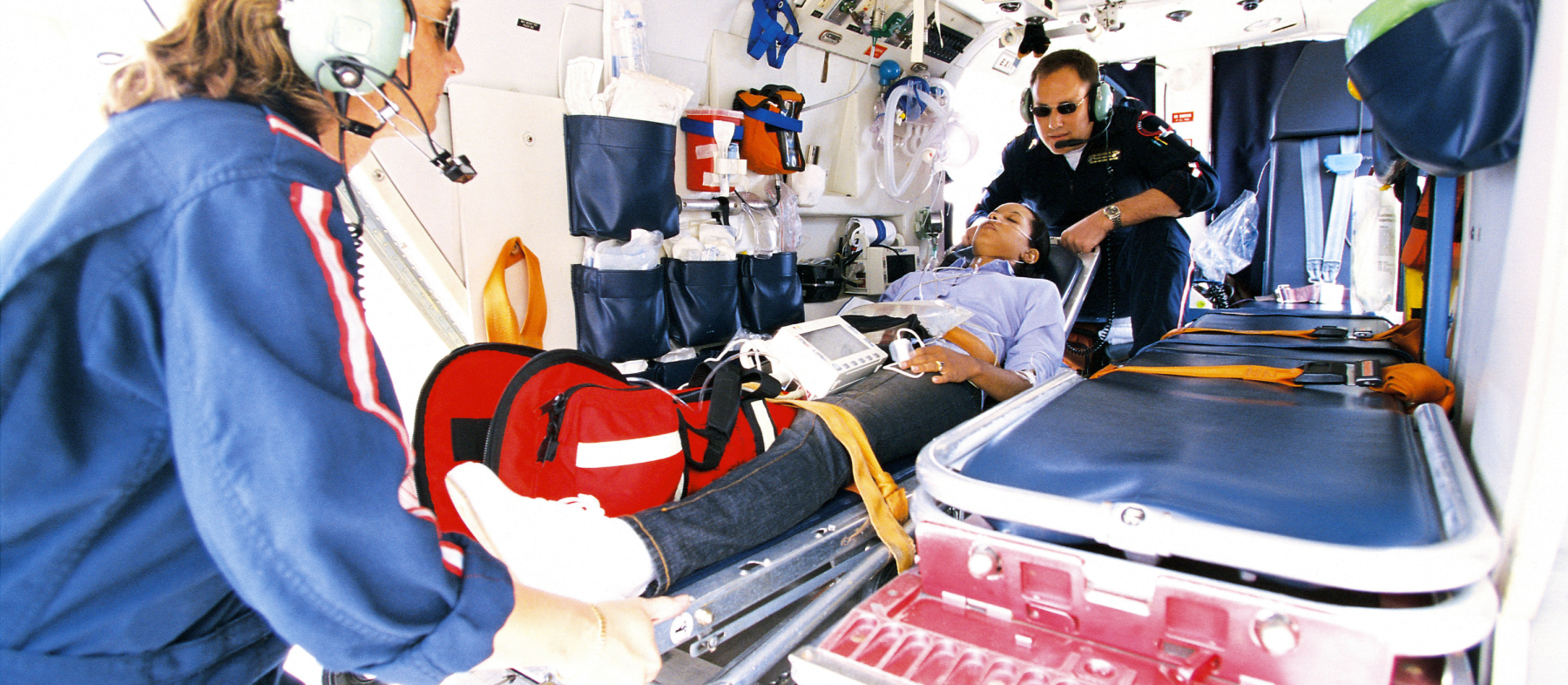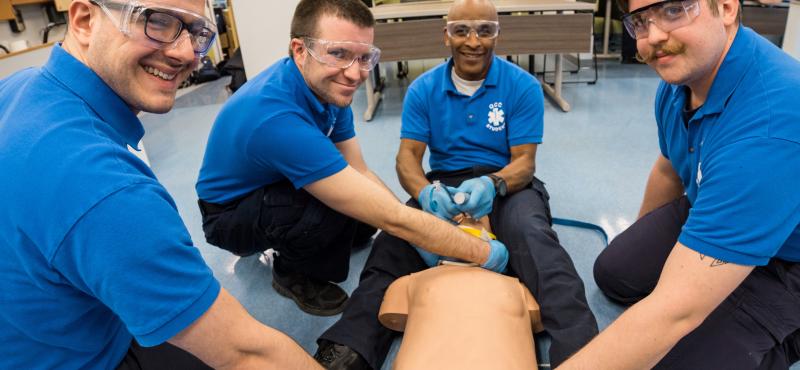Program Goals:
The goal of the EMT Paramedic Certificate is to prepare competent entry-level emergency medical technician-paramedics to serve in career and volunteer positions throughout the Commonwealth and neighboring regions.
Student Learning Outcomes:
Upon completion of the program, graduates will be able to:
- Comprehend, apply, and evaluate the didactic, lab, clinical, and field information relative to the graduate’s role as an entry-level paramedic, and to display behaviors consistent with the professional and employer expectations within the Commonwealth.
- Demonstrate technical proficiency in all skills necessary to fulfill the role of entry-level paramedic within the Commonwealth, including, but not limited to:
- Administer advanced life support care to sick and injured persons from pre-term through geriatric patients.
- Assess the nature and extent of illness or injury to establish and prioritize medical procedures to be followed, or assess the need for additional assistance.
- Restore and stabilize heart rhythm on pulseless, non-breathing patients, using defibrillator, cardioversion, or external pacemaker.
- Monitor cardiac patients using electrocardiograph.
- Initiate intravenous fluids to administer medication, or to replace fluids to the body.
- Perform endotracheal intubation, or other advanced airway techniques, to maintain the patient’s airway and to ventilate the patient.
- Administer injections of medications.
- Record patient vital signs, including blood pressure, pulse rate, respiratory rate, skin color, texture and temperature, pupil response to light, capillary refill time, blood glucose reading, pulse oximetry and capnography.
- Extricate entrapped victims.
- Observe, record, and report any changes in patient condition to the physician.
- Operate and maintain control of the emergency response vehicle.
- Function in the role of team leader for additional personnel involved in any emergency scene.
- Communicate effectively to additional personnel at scene or to hospital personnel via radio/telephone systems.
- At the completion of didactic, clinical and field practicum, the paramedic student is prepared to sit for the National Registry of Emergency Medical Technicians Psychomotor and Computerized Examinations.
Admissions Process:
Admissions inquiries should be directed to admissions@qcc.mass.edu. Prospective students may apply to the program of their choice by following the enrollment steps at www.QCC.edu/enrollment-steps.
Program Admissions Requirements:
Students should note that some first semester courses carry minimum prerequisites. Refer to the program grid.
- High School Diploma or GED/HiSET.
- Current EMT-B certification in good standing.
- One year of EMT-B certification as verified by letter from employer; or if less than a one year of employment, supervisor to indicate if applicant (in their opinion) has equivalent to one years’ worth of patient contacts.
Program Retention / Progression Requirements:
To be eligible to continue in the program, students must:
- Achieve a grade of “C” or higher in all program courses designated by MED.
- Maintain documentation of current American Heart Association Healthcare Provider Level BLS/CPR Certification.
- Maintain documentation of immunization currency and satisfactory health status.
- Maintain documentation of annual TB testing.
- Maintain documentation of health insurance.
- Maintain an active Massachusetts OEMS certification for EMT, or National Registry of EMT’s registration throughout the duration of their program enrollment.
- Be aware that they may be exposed to airborne and bloodborne pathogens. Airborne and Bloodborne Pathogens means pathogenic microorganisms that are present in human blood and normal atmospheric conditions that can cause disease in humans. These pathogens include, but are not limited to, hepatitis B virus (HBV) and human immunodeficiency virus (HIV), influenza, SARS, SARS-CoV-2 (COVID-19), or other potentially serious infectious diseases. United States Department of Labor, OSHA, September 5, 2019 (www.osha.gov/laws-regs/regulations/standardnumber/1910/1910.1030).
Program Readmission Requirements:
There is a one-time readmission policy for the program.
- Readmission is not guaranteed and is always based upon space availability.
- Students who did not earn a grade of “C” or higher in MED 110, MED 120, and MED 130 need to re-apply to the program through the Admissions Office. Students need to meet the current admission requirements. Students should contact the Program Coordinator as soon as they receive the notification of being placed on the waitlist (by April 15) to discuss readmission.
- Students who did not earn a grade of “C” or higher in any other MED course should contact the Program Coordinator by April 15 to discuss readmission.
- Students who have been dismissed or administratively withdrawn from a program within the School of Healthcare at Quinsigamond Community College for reasons of “clinically unsafe practice/behavior” or who violate the College’s Student Code of Conduct or Policy on Affirmative Action are not eligible for admission/readmission to any Healthcare program.
Program Graduation Requirements:
Students must satisfy all course and program requirements, including regulations related to attendance and conduct, in order to be eligible for graduation.
CORI, SORI, Finger Printing & Drug Testing:
Criminal Offender Record Information (CORI), Sex Offender Registry Information (SORI), and National Background checks are required in the program, either annually or every semester. Fingerprinting and drug testing may be required. Fingerprinting and drug testing results must meet clinical requirements. An issue with CORI/SORI, National Background, fingerprinting and/or drug testing could prevent a student from participating in a clinical/field rotation, which could result in dismissal from the program.
Additional Cost:
See the Program Fees page.
- Cost for NREMT Paramedic Computerized Exam: $125.00. Psychomotor costs vary by site: approximately $180.00. Uniforms for clinical and field practicum vary per semester by student agreement. Estimated current cost: $200.00.
- Additional cost applies to become certified as a Massachusetts paramedic, once nationally registered: $150.00.
Technical Performance Standards:
See the Technical Performance Standards page. (Note: Not all programs have technical performance standards).
- The QCC Emergency Medical Services/Paramedicine program is deeply committed to diversity and fostering an inclusive environment that represents the diverse population of healthcare professionals. We value the uniqueness and potential of every learner and strive to create a culture of respect and equality, welcoming all students, including individuals with disabilities. We encourage students with disabilities to disclose their needs and seek accommodations to fully engage in our program. All disability-related conversations and requests are handled through a confidential process to protect the privacy of our students. After reviewing the Technical Performance Standards, students who have questions about accommodations should contact QCC Student Accessibility Services as soon as possible. Given the complexities of clinical-based programs, additional time may be needed to effectively implement accommodations.
- For more information, contact QCC Student Accessibility Services:
Credit for Prior Learning:
Credit for Prior Learning (CPL) allows students to use skills they already have towards a college degree or certificate. Work, life, volunteer and military experience may be translated into credit, allowing students to take fewer classes and earn their degree faster. CPL eliminates redundancies for students who have already earned credentials or mastered skills required for their program of study. Email experience@qcc.mass.edu for more information and eligibility.
Career Outlook:
Please consult the Massachusetts Career Information System at https://masscis.intocareers.org/ or the Occupational Outlook Handbook at www.bls.gov/ooh/ for specific occupational information. The CIP code for this program is 51.0904.
Transfer Articulations & Opportunities:
Prospective students may learn more about transfer articulation agreements at www.QCC.edu/agreements. More information regarding transfer opportunities is available at www.QCC.edu/transfer.


